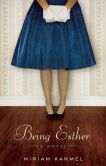A novel about books: buying, selling, collecting them; a possible lost/destroyed book used by Shakespeare for a play; a mysterious portrait hidden in a collection of (possibly) forged books; two families at war over the possession of manuscripts for generations. No wonder the subtitle reads: A Novel of Obsession!
Not everyone can take a
super-introverted book nerd and make him into a romantic hero with a quest,
courage, and the purity of heart of a Grail Knight, without seeming ridiculous.
Charles Lovett has done that and more in The Bookman’s Tale. The story starts
with bookseller Peter Byerly holed up in a cottage in a small town in England.
He has fled there from the U.S. after his wife’s sudden death and is barely
surviving emotionally.
While trolling the shelves of a used
bookstore, he finds what appears to be a Victorian-era portrait of Amanda, his
late wife, in an old book. He smuggles it out in a purchased book and sets out
to find out the story behind the drawing. And so, “the game’s afoot” (Henry V,
iii. 1).
The story moves from contemporary
(1995) time to the 17th century to the 1980’s (when Amanda and Peter
met) and back again very smoothly. The
suspense builds cleverly in each story line, so even the various minor players’
actions drew me into their lives.
I love books about books,
Shakespeare, libraries, dusty bookshops, English villages, clever (but not
snooty) people, history, and then to have them all wrapped up in a mystery! "Can
one desire too much of a good thing?" (As You Like It, iv. 1).
CAS
Book lovers' read-alikes: The Name of the Rose by Umberto Eco; The Thirteenth Tale by Diane Setterfield; The Shadow of the Wind Trilogy by Carlos Ruiz Zafon.




